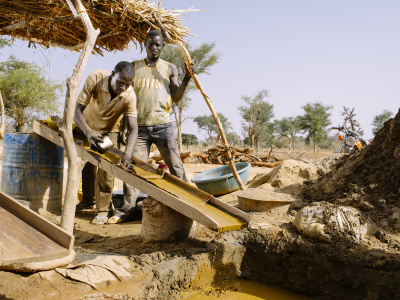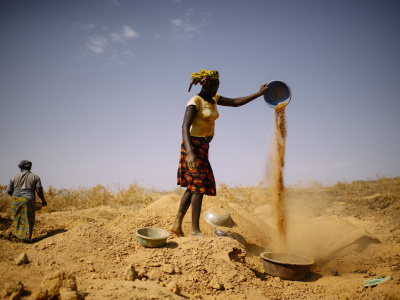
Blueprints for sustainable industrialisation in West Africa: Lessons from resource-rich Nigeria
Sustainable industrialisation is the key to unlocking inclusive prosperity in West Africa. Nigerian companies like LADOL provide valuable examples of how the private sector can drive development in these resource-rich, high-growth, low-income markets.
Over 160 years ago the Industrial Revolution began in Britain and radically transformed the British and then the global economy through the deployment of technology. The world is now going through a similar period of change – but this time the engines of development, notably in resource-rich countries, will be high-growth, low-income countries.
The SDG framework
The 2030 Agenda provides a roadmap that indigenous private companies can use to drive prosperity in low-income high-growth regions of the world. The Sustainable Development Goals (SDGs) all set parameters that multinationals in the West can follow to achieve SUSTAINABLE globalisation, that is, globalisation that leads to mutual prosperity for the multinational and the nations in which it operates.
The SDGs are empowering because they apply equally to the challenges all countries face, and they give us all a blueprint to guide us in overcoming them. The SDGs demand dramatic changes in the global deployment of capital, since an estimated US$1.4 trillion must be invested annually towards achieving the Goals. The Goals also demand that governments use their regulatory power to create policies and institutions that support their local private sectors, which in turn could lead to the local and international private sector funding 50% of this US$1.4 trillion funding need.
The Business and Sustainable Development Commission (BSDC) launched a report at Davos in January 2017 that eloquently and scientifically lays out the business case for the SDGs. By sustainably pursuing business opportunities in just four sectors (energy, urbanisation, healthcare and agriculture) the private sector will add US$12 trillion to global GDP by 2030.
Looking to Nigeria
The UN estimates that by 2050 Nigeria will be the third most populous country in the world, with the majority of its population under the age of 30. Africa will be the only continent remaining where the working age population is growing and most of that demographic will already be in the continent. This demographic windfall guarantees private sector investors that move into this market now a place in the fastest growing market in the world, as opposed to the choice many of them are currently making to double down on investments in regions where growth is slowing.
As the largest country in Africa, by population and GDP, Nigeria clearly has the potential to be the engine of growth for the entire continent. However, Nigeria is also one of the most complicated and commodity export-dependent economies in Africa. Quickly getting Nigeria on the path to widespread sustainable industrialisation through the empowerment of its legitimate private sector companies is the key to finally unleashing its full potential.
Nigeria’s relatively stable government under President Buhari is restoring confidence in the rule of law, reinforcing private sector competition and squashing corruption. Its private sector now, more than at any other period in the last decade, has a platform for generating the level of sustainable industrialisation needed to carry the country closer to G20 status and spread prosperity across the West Africa region, beyond the export of raw commodities.
Any approach to sustainable development needs to provide more members of society with incentives to participate and work hard in order to pump new life into the local private sector. This could ignite a chain reaction where prosperity spreads to more of the population, the government collects more taxes, and investment from the international business community pours in again.
Change requires bold actions: the experience of LADOL
At LADOL we are providing the highest profile and most tangible example of how the real private sector can invest, create value and drive sustainable industrialisation. The success of LADOL has also helped to encourage government and civil society to enforce and create policies that foster a competitive business environment, suitable for long-term investment. The company’s aim is to build a blueprint for sustainable industrialisation that integrates creating jobs and upskilling the local workforce, whilst increasing industrial capacity and localising supply chains through infrastructure and facilities development and operation, 24/7.
For over a decade LADOL has been developing the largest private, locally-owned and operated industrial Free Zone in Nigeria. The Free Zone was built up out of a disused swamp inside the busiest port in West Africa. It is now supporting the most complex oil and gas-related projects carried out in Nigeria. The facilities in the Zone include a fully integrated logistics base that will save the offshore oil and gas sector US$1 billion per year by offering access to high quality services and labour locally. LADOL is also home to the largest shipyard in West Africa, which will generate 50,000 direct and indirect jobs in the next decade.
In the fourth quarter of this year, LADOL will welcome the Total Floating Production Storage and Offloading (FPSO) vessel for the Egina oil field. This 380 meter-long vessel will be the largest ever to berth in West Africa and the first to be partially integrated onshore in Nigeria. This project will dramatically increase the local demand for manufacturing and engineering – as integrating vessels and oil rigs locally will shift the centre of gravity for large projects in Nigeria, including the upcoming Bonga South West, another deep offshore oil project. This shift will be driven by pure economics; simply put, using local manpower and facilities for engineering and manufacturing will save the industry billions of dollars in development and maintenance costs over the lifetime of the oil block.
The founders of LADOL are now focused on diversifying out of the petroleum sector and leveraging the infrastructure and know-how in the Zone to attract and support a range of industrial companies in numerous sectors from agri-processing to car and aviation manufacturing. LADOL will become the template of how sustainable industrialisation can be done across West Africa. LADOL clearly shows that the issues encountered in many established markets, from lack of infrastructure to corruption, can all be overcome through a combination of committed local long-term investment and know-how, as well as enabling laws and policies.
Local empowerment
Breaking ground in 2018, LADOL’s Upskilling Academy will provide a lifelong learning platform for Nigerians, offering access to a range of vocational training and development programmes for graduates to executives. This venture will be supported by private companies and non-governmental groups who will be able to set up their own schools within the academy. By working with local and international organisations to grow skills in country, the private sector is ensured access to a skilled, cost competitive, sustainable work force – creating shared value, which is more important than ever.
Private sector-led investment in industrialisation and local talent has knock-on effects, for example creating space in the market for new ancillary businesses. In high-growth, low-income countries like Nigeria, investment from private sector actors has the potential to make the most impact by more efficiently increasing local participation in the economy through democratisation of access to the means of production. Over time the economic divide between rich and poor countries will have a chance to close.
It is important that sustainable industrialisation is driven from within individual countries. As Daron Acemoglu and James A. Robinson describe in Why Nations Fail, it is imperative political environments are established in a way that allows inclusive economic institutions. Such change requires self-motivation. In Nigeria, this has not always been the case; LADOL’s path hasn’t always been clear or easy. Therefore, the private sector must work with local government to create a framework where inclusivity is encouraged and rent-seeking behaviour is eliminated.
Role of the international community
Commitment to sustainability must extend to international actors also. Multinational corporations, international governments and world citizens all have a role to play in Africa’s development but their outlook must be long-term. For example, by complementing local private sector partnerships and setting mutually beneficial contracts, multinationals can realise higher profits while stimulating growth where it is needed most.
Get ahead
While countries like Nigeria still require a lot of work, the potential for local and international business is clear. The speed at which companies and governments embrace sustainable industrialisation and globalisation, led by the private sector, to stimulate prosperity in high-growth, low-income, resource-rich countries, will directly influence the time it takes to alleviate widespread poverty. Now is the time for companies in West Africa and beyond to take the first mover advantage and ensure that they are at the forefront of a US$12 trillion economy that will also save the world.
About the author
Dr. Amy Jadesimi is the Managing Director and CEO of LADOL, a free zone and multi-logistics services base in Nigeria. Beyond LADOL, Amy is on the Prince’s Trust International global advisory board, a founding commissioner of the Business and Sustainable Development Commission and a Forbes contributor. She has been named by the Financial Times in July 2015 as one of their Top 25 Africans to watch.
Read the full magazine issue




